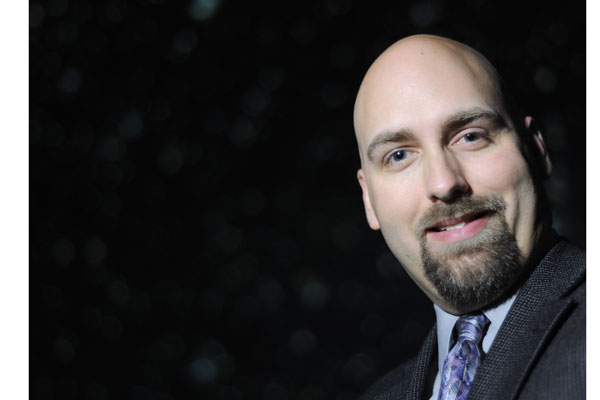President's Blog: From the Heart

Fly Me to the Moon
By Eric F. Spina
Professor Josh Ambrosius set the mood for a class discussion about space and religion by playing “Count the Stars,” a beautiful hymn with an out-of-this-world twist. Listen closely, he told us, and you can hear the electromagnetic “voices” of planets, stars, and galaxies.
Mesmerizing. That’s the only way to describe the NASA-provided audio for this worship piece that celebrates the God of creation.
Much like the song, this popular CAP course, “Space Exploration: Toward a Spacefaring Society,” is innovative in its approach. For openers, it’s the only class I’ve ever attended with its own soundtrack that the professor and students are creating. The space-oriented playlist includes David Bowie’s “Space Oddity” as well as the Star Wars theme song and my personal favorite, Frank Sinatra’s “Fly Me to the Moon.” Every class kicks off with a song.
It’s also intentionally interdisciplinary in nature as it weaves religion, political science, sociology, and economics into a course that approaches space exploration from a social science and public policy perspective. Besides religious views of space exploration, the students study public opinion on space issues, outer space law, the private space industry, future developments in space policy, and social shifts, including the effect of a possible future discovery of extraterrestrial, even intelligent, life on other planets.
It’s an engaging class. On the morning I attended, Professor Ambrosius openly shared elements of his personal faith journey and encouraged the students to reflect on their own. He was raised as an evangelical, but converted to Catholicism. For him, outer space and faith meet at “an intersection” he’s passionate about — even though he’s not an astronomer, astronaut or theologian. He’s a professor of political science who’s captivated by space exploration and divinity and has made it part of his research agenda.
“Why study religion and space?” he asked the class.
“They’re both a way to explain human life and the universe,” one student answered.
“Everything is really big and I’m feeling small,” another offered. “It makes you aware of the vastness of life and your own existence.”
“Space is the final frontier and the greatest unknown. God is another conceptual unknown. Both are the greatest unknowns,” another responded.
“Will we see tourists in space? Will we put boots on Mars? Will we discover life off Earth?” asked Professor Ambrosius before discussing his own research that examines the influence of religion on public support for U.S. space exploration policy as well as evangelical Protestant support for unlocking the mysteries of space.
As Professor Ambrosius talked to the class, I flashed back to my own fascination with space. As a child in 1968, I watched the Apollo 8 space launch on TV and listened to astronauts from 239,000 miles away talk about their awe as they orbited the moon for the first time.
Did they marvel at the technical expertise that delivered them into lunar orbit? No. In humble and reverent tones, they reminded us of our origins, of our humanity, of the greatness of God who created a world of such beauty and awe.
How wonderful that, 55 years later, UD has a professor who is able to use his talents, draw on his expertise, and reflect on his own humanity to help students learn important academic lessons and consider the vastness of creation.
UD faculty and staff continuously amaze me with their talent, skills, and commitment to our students.
(To read more about Professor Ambrosius' SSC 200 course, see this summary written for The Conversation and a peer-reviewed article appearing in the journal Space Policy.)
